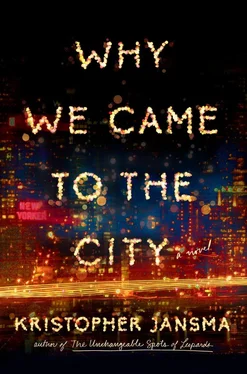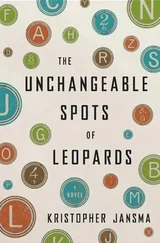• • •
Nurse Moira stood at the main nurses’ station with Irene Richmond’s forms in front of her. The emergency contact number was for Sara Sherman. She punched the numbers into the phone and checked her watch again, hoping she could wrap up the call in time to do her rounds before her boyfriend called. Someone half-asleep answered. “Ms. Sherman?” she asked. “I’m very sorry to wake you, but Irene has slipped into a deep sleep. She’s only breathing now with the help of a respirator.” They could keep her on it and she would remain alive, but she wouldn’t wake up. “My advice is to go back to bed,” the nurse said. “She’ll be the same in the morning.”
• • •
Sara hung up without saying goodbye. Go back to sleep? Her whole body was shaking as she got up and threw her clothes on. She was already half dressed by the time George realized what was going on. “It’s happening?” he asked her. She didn’t respond, but he knew it was. He was still getting his shoes on when he saw her running out the door. It took him a moment to realize that she wasn’t waiting for him. He made it down to the street just in time to see her get into a cab. She was gone before he could shout for her.
• • •
Irene wandered up and down the hills of the park. In the winter wind that whistled by her ears, she heard whispering. In the gusts that came this way and that, she felt a firm hand on her back. In the city, the wind usually blew in an easterly direction, out to sea, but strange cross-currents were pushing her west, to the far edge of the park. Maybe the dead became winds, just areas of pressure, moving this way or that. Sometimes a breeze, sometimes a whole continental front or a wicked storm. Sometimes a great and sticky stillness. Traveling the globe by indiscernible patterns. Clumping into clouds and vanishing through the ozone layer. Maybe heaven was just the air all around. Maybe this cold wind around her was her grandmother. Maybe it was some other ghostly presence. Maybe it was Achilles, though she hoped it was Hector. The city was so alive that simply walking around in it was a life-support system. Its pulsing avenues flooded her veins; its streets flushed her arteries; its people burst this way and that like the valves of her heart. On the other side of Broadway, the road sloped sharply downward, and it became even easier to go on. She felt as she had wanted to feel all along. As if she were falling, steadily, toward the wide, dark river.
• • •
George caught a second cab, and from there he called William, and William called Jacob. Afterwards, with nothing else to do he stared out the window at Central Park, its paths and lawns shadowed and quiet. Then, just as he was thinking of trying Sara, he saw, bobbing above the treeline, the outline of Spiderman, and — he wasn’t sure if he was dreaming — Ronald McDonald. It took him several minutes to piece together that these must be for tomorrow’s big parade. They arrived at the hospital just a few minutes apart, sometime past three-thirty. Sara had already set Nurse Moira straight. They wouldn’t be waiting until morning. They wanted to go to the ICU immediately, where Irene had been taken for closer monitoring. Nurse Moira said she’d get it figured out and then disappeared. They waited a long time. George found some coffee. William and Jacob watched an infomercial about a new device that ensured your socks would never again be separated in the wash. Eventually Nurse Moira came back with forms for Sara to sign, and a doctor had to sign off, and though they’d been through it already six or seven times before, there was the usual confusion over why Sara, no relation to Irene, was the one listed on all the forms.
Finally, someone named Dr. Ramos took them to see Irene in the ICU. She was laid out under some white sheets, fast asleep, mouth stretched open around a plastic breathing tube as thick as a tennis ball. Sara began crying immediately, and George barely registered that Dr. Ramos was quietly explaining to him that they would need to wait a bit longer. He couldn’t actually take her off the respirator. He was Catholic, and while he in no way judged them, he couldn’t morally take a living woman off life support.
Sara and Jacob and George all yelled at him at once. William watched, silently, as their raised voices registered no movement whatsoever on Irene’s still face. Dr. Ramos left, and everyone cooled down. They waited almost another hour until the second doctor could be found. Dr. Hanks came around five a.m. to begin the proceedings.
• • •
Irene entered the long, thin park along the river, not sure exactly how to get across the West Side Highway on the far side. There the Hudson coursed mightily, its purpled surface forever lit by the coast of New Jersey. Near the river, the winds began to push in different all directions. Up toward the distant spire of a cathedral by Columbia. Back toward Broadway. Deeper into the park. Then up on the hill, she spotted something. Tall, white Greek columns reached up through the night, supporting a great marble dome on the top. It looked like some kind of lighthouse, or a tomb. Had she been here before? A long time ago, maybe? She thought she’d have remembered it better if she had. Though it was only fifty or so feet up in the air, it looked like Mount Olympus with the Pantheon on top. All the winds now seemed to be pushing her this way, as if they too wanted to have a word with the gods.
She wasn’t alone. Not far away, on the ring of benches around the memorial, a man lay buried beneath a mass of unfolded cardboard boxes. He wasn’t moving, and Irene knew well that this night was too cold to sleep in, no matter the number of boxes you made into blankets. Her red coat was a muddy, stained mess now. If she couldn’t get up, then she too would freeze to death before morning. It seemed fitting, she guessed. To die in the cold like a homeless person, which was what she had always been, in a way. One of the thousands of people who were everywhere and nowhere all the time. To die here would seal it. And at the foot of this beautiful monument, in this stolen coat, in these soggy excuses for shoes — it seemed like an honorable place to lie down.
• • •
Nurse Moira stayed with them the whole time, but William couldn’t take it. He said his goodbyes and left just as they were about to begin removing her breathing tube. George and Sara went up together, hugging and squeezing and kissing her, but she barely moved. It was only when Jacob went up and whispered something in Irene’s ear that they all saw her smile slightly, around the sides of the tube. George and Sara demanded to know what he’d said, but he wouldn’t tell. Eventually Nurse Moira helped Dr. Hanks remove the tube from Irene’s throat. They all watched to see if she’d open her eyes again. If she did, they wanted her to see them there, stationed by her side.
• • •
Except death didn’t come. She tried to slow her breath and just let it happen, but it didn’t. She found herself staring up at the tarnished plaque embedded in the stone wall of the monument, which read:
ERECTED BY THE CITY OF NEW YORK
TO COMMEMORATE THE VALOR
OF THE SOLDIERS AND SAILORS
WHO IN THE CIVIL WAR
FOUGHT IN DEFENSE OF THE UNION
Suddenly it seemed all wrong. She was no sailor; she was no soldier. She wasn’t Hector, and this was no war that she’d been fighting. On each side of her stood a marble plinth, carved with the names of fathers and sons who’d sunk along with their ships. Boys and men who’d drowned in icy waters, far from home. Must be nice , she thought, to die next to your brothers . What did they always say? Born alone, die alone? But who was ever really born alone? And why die alone if you didn’t have to?
Читать дальше












